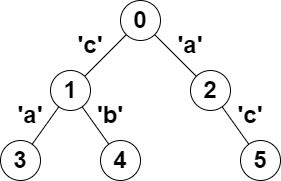LeetCode-in-Java
2791. Count Paths That Can Form a Palindrome in a Tree
Hard
You are given a tree (i.e. a connected, undirected graph that has no cycles) rooted at node 0 consisting of n nodes numbered from 0 to n - 1. The tree is represented by a 0-indexed array parent of size n, where parent[i] is the parent of node i. Since node 0 is the root, parent[0] == -1.
You are also given a string s of length n, where s[i] is the character assigned to the edge between i and parent[i]. s[0] can be ignored.
Return the number of pairs of nodes (u, v) such that u < v and the characters assigned to edges on the path from u to v can be rearranged to form a palindrome.
A string is a palindrome when it reads the same backwards as forwards.
Example 1:

Input: parent = [-1,0,0,1,1,2], s = “acaabc”
Output: 8
Explanation:
The valid pairs are:
-
All the pairs (0,1), (0,2), (1,3), (1,4) and (2,5) result in one character which is always a palindrome.
-
The pair (2,3) result in the string “aca” which is a palindrome.
-
The pair (1,5) result in the string “cac” which is a palindrome.
-
The pair (3,5) result in the string “acac” which can be rearranged into the palindrome “acca”.
Example 2:
Input: parent = [-1,0,0,0,0], s = “aaaaa”
Output: 10
Explanation: Any pair of nodes (u,v) where u < v is valid.
Constraints:
n == parent.length == s.length1 <= n <= 1050 <= parent[i] <= n - 1for alli >= 1parent[0] == -1parentrepresents a valid tree.sconsists of only lowercase English letters.
Solution
import java.util.Arrays;
import java.util.HashMap;
import java.util.List;
import java.util.Map;
public class Solution {
private int getMap(List<Integer> parent, String s, int[] dp, int idx) {
if (dp[idx] < 0) {
dp[idx] = 0;
dp[idx] = getMap(parent, s, dp, parent.get(idx)) ^ (1 << (s.charAt(idx) - 'a'));
}
return dp[idx];
}
public long countPalindromePaths(List<Integer> parent, String s) {
int n = parent.size();
int[] dp = new int[n];
long ans = 0;
Map<Integer, Integer> mapCount = new HashMap<>();
Arrays.fill(dp, -1);
dp[0] = 0;
for (int i = 0; i < n; i++) {
int currMap = getMap(parent, s, dp, i);
int evenCount = mapCount.getOrDefault(currMap, 0);
mapCount.put(currMap, evenCount + 1);
}
for (Map.Entry<Integer, Integer> entry : mapCount.entrySet()) {
int value = entry.getValue();
ans += (long) value * (value - 1) / 2;
for (int i = 0; i <= 25; i++) {
int base = 1 << i;
if ((entry.getKey() & base) > 0 && mapCount.containsKey(entry.getKey() ^ base)) {
ans += (long) value * mapCount.get(entry.getKey() ^ base);
}
}
}
return ans;
}
}

